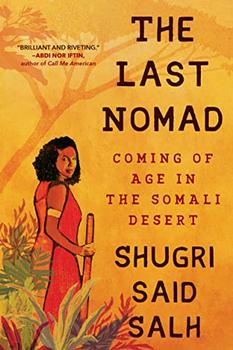Write your own review!
 CarolT
Eye-opening
CarolT
Eye-opening
Shugri Said Salh had offered us a chance to see exactly what it was - or is - like to be a nomad in Somalia and then a refugee running from a war. So much to learn!
Barbara
An Abundance of Cultural Knowledge
The Last Nomad is a cultural gem. Living in Somalia as a child, Shugri Said Salh writes about her family life as a nomad with her ayeeyo (grandmother). She also writes about her family relationships: father, mother, sisters, brothers. Life wasn’t totally as a nomad, especially when she lived with her father and attended school in a small village.
There were so many things I enjoyed about her family life…the camels, the neutering of the goats, the strong will of Shugri Sahl’s ayeeyo, the children feeling secure with the basics of food, water and being cared for. There were moments that weren’t acceptable for her young life…fear of being raped, physical punishment by her father, female genital mutilation.
The most important event for the author happens in her teens, when she escapes Somalia and Kenya and flees to Canada. The constant fear during the Somalian War is finally erased after her immigration. Following relocation to life in California, the author realized the amazing contrast between her life as an adult in America and as a child in Somalia.
 Rebecca
Even Better than I Hoped!
Rebecca
Even Better than I Hoped!
When I first saw a brief synopsis for THE LAST NOMAD, I knew I wanted to read it. I didn't know if it would be a dry, textbook telling of the author's life, but I can honestly say that it was far from dry or textbook; it immediately grabbed my interest. The author included details of the nomadic lifestyle - long treks to find and bring back water, living in tents, packing belongings on camels to move, the allure of the city in more modern times, but also the heartbreak of a culture that found value in male children. It was that attitude that led to Shugri's assignment as caretaker for the grandmother. This meant being withdrawn from school, separated from her family, and destined for a life of illiteracy in a world that was harder and herder to navigate without education. I think both YA and adult readers will thoroughly enjoy following Shugri's life which turned out so very different than she or her parents could have ever imagined. The book helps readers to understand how difficult life can be when one is transplanted in a totally different country and culture.
Sonia Francis
Story teller becomes an archeologist
“Like an archeologist desperately excavating a foreign world, I want to bring the details of my nomadic upbringing to life before it is lost forever “. “ I don’t want the library of my past to die with me”.
How lucky for readers like me to have someone like Shugri Said Salh who poignantly tells her story growing up a nomad in the desert of the East African country, Somalia.
Shugri has narrated a clear eye unflinching account of her life as a young girl at 6 years old , when she was sent to live with her nomadic grandmother in the desert. Such imagery of the landscape; livestock, and how camels are used to go from place to place to find greener pastures, to find water and food. I love the way Somali terms are used in a sentence while at the same time explaining the meaning. Words like “Jilal”- At the end of Jilal, the long and dry season. This style of writing made it very easy to explore and comprehend Somali culture effortlessly. Words like eeidio (auntie),devotee (waadad) mother (ayaeyo) to name a few.
Religion, clans, female circumcisions were some of the cultural aspects explored in this coming of age novel.
The Somali proverbs at the beginning of the chapters was a clever harbinger. “Oh lord, sad is the soul that leaves its native land”. This chapter further went on to show events about one fleeing their homeland due to war, albeit a civil war, where friends, neighbors turn on each other all in the name of protecting ones clan. The most disturbing part of the book for me was what adolescent girls must endure in the most brutal unhygienic, primitive medical way called female circumcision and the scar literally and figuratively it left on young girls including the author herself.
Knowing Salh’s story makes me want to know more about the strength, tenacity and resilience of Somali women. This book is indeed an eye opener. I have Salhs’ grandmother to thank for having her granddaughter inherit the gift of storytelling and pass it on to readers.
This is a stunning read- raw and authentic.
Ginger Noyes
Very Vivid
As I read this book and its stories I was engulfed in the imagery that I myself was living it.
